Issue 22 | November 2021
November is Indigenous Disability Awareness Month (IDAM)

Indigenous peoples of Canada experience a disability rate significantly higher than that of the general population. Indigenous Disability Awareness Month (IDAM) brings awareness of these barriers and the issues that Indigenous peoples living with disabilities and their families face every day. In spite of these barriers, there is much to celebrate.
IDAM highlights the achievements of Indigenous peoples living with disabilities and recognizes the significant and valuable contributions they make to our communities socially, economically, and culturally. IDAM was created by the British Columbia Aboriginal Network on Disability Society (BCANDS) in 2015.
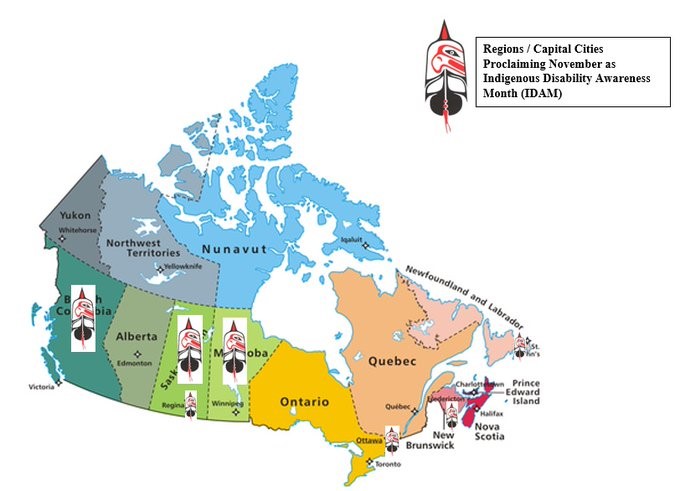
The Manitoba government has now proclaimed the month of November as Indigenous Disability Awareness Month. Manitoba is the third province to officially proclaim IDAM.
Get involved & recognize the valuable contributions that Indigenous peoples living with disabilities bring to our communities!
BCANDS IDAM Webinar Series - Online Learning Opportunities
Throughout the month of November, BCANDS is hosting a series of webinars exploring the challenges and contributions faced by Indigenous peoples living with disabilities. Join people across Canada for these informative and engaging sessions, including a webinar featuring people local to Manitoba on November 24th.
- Featuring
- Audrey Henderson and Sharon Courchene, Southeast First Nations Disability Project Initiative (Sagkeeng First Nation)
- BCANDS
- BC government
- Manitoba Accessibility Office
Online Learning Portal - New Module on Accessible Employment

The Manitoba government encourages organizations to meet their employee accessibility training requirements by completing standard-specific learning modules on its new online learning portal. Complete this free training anytime from anywhere.
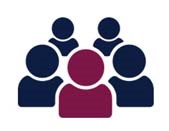 The second module expl ains the requirements of the Accessibility Standard for Employment Service, with examples on how to achieve compliance, tips for best practices and useful resources. Employees can show that they have completed the training by downloading a certificate after completing the module. The second module expl ains the requirements of the Accessibility Standard for Employment Service, with examples on how to achieve compliance, tips for best practices and useful resources. Employees can show that they have completed the training by downloading a certificate after completing the module.
To access the online learning portal, visit: AMALearningMB.ca
December 3rd International Day of Persons with Disabilities - Registration Open
The MAO is pleased to host an online celebration of International Day of Persons with Disabilities “IDPD 2021: Removing Barriers for People Who Use Service Animals”.
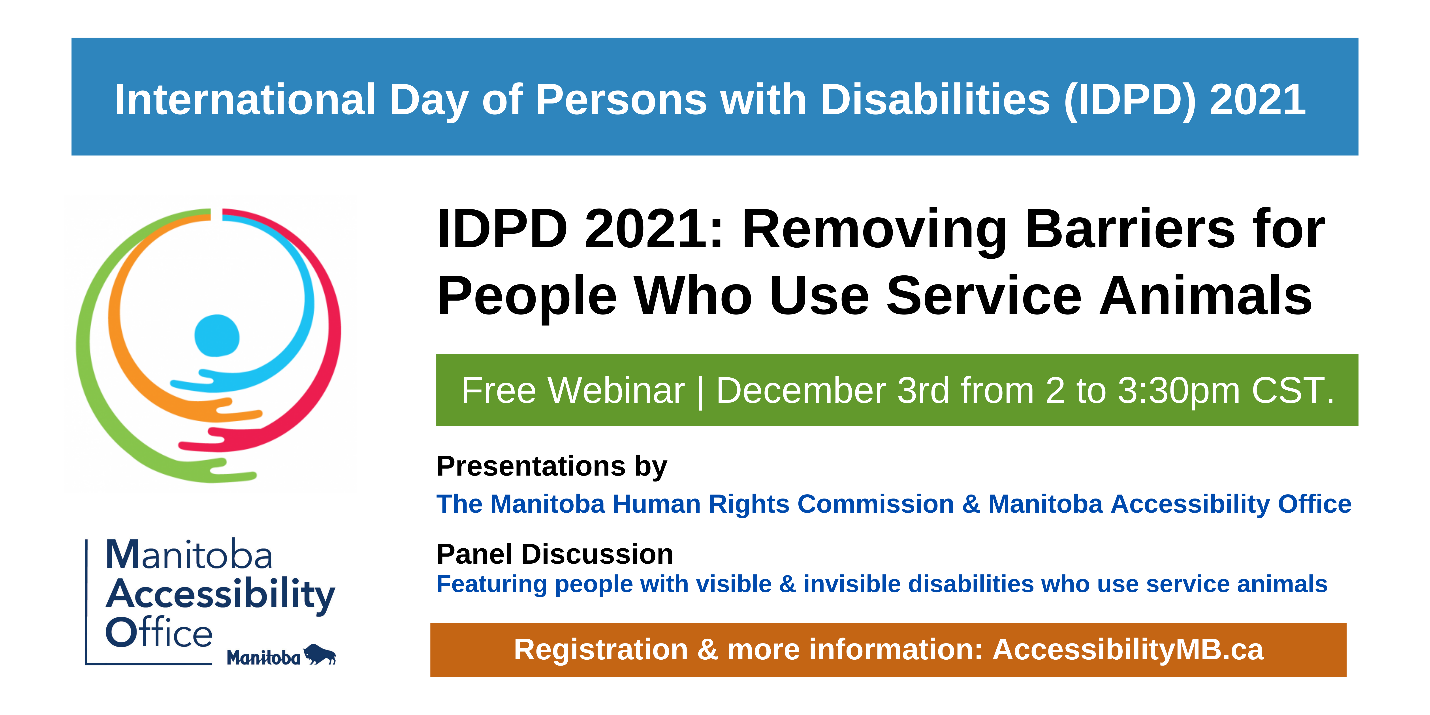
Date: Thursday, December 3, 2021
Time: 2:00 to 3:30 p.m. CST
Registration: https://maoidpd2021.eventbrite.ca
The webinar will focus on the Convention on the Rights of Persons with Disabilities’ articles that support the rights of persons with service animals, particularly related to accessibility (Article 9) and liberty of movement (Article 18).
Featuring:
• Presentations by The Manitoba Human Rights Commission and the Manitoba Accessibility Office
• Presentations by The Manitoba Human Rights Commission and the Manitoba Accessibility Office
A panel discussion among people with visible and invisible disabilities who use service animals, including Yvonne Peters (moderator), Vivi Dabee, and Bill Tucker
For more information, please visit: https://accessibilitymb.ca/idpd.html
We are seeking input from sectors related to retail, hotels, restaurants and housing about situations and questions pertaining to service animals that you would like the panelists to address.
For instance, some of the common questions we have heard include:
1. If a service animal enters a store, hotel or restaurant, how do we know it’s a service animal as opposed to a pet?
2. Do service animals need to be registered?
3. Our apartment building does not allow pets, but one of our tenants says his cat provides emotional support. How do we handle this?
We would appreciate other scenarios or concerns. Please forward your input to MAO@gov.mb.ca.
Reminder: May 1, 2022 Compliance Deadline - Accessibility Standard for Employment
To help employers meet the requirements of the Accessibility Standard for Employment, the Manitoba Accessibility Office has created two new resources:
These new resources are included among a variety of learning tools, such as the:
Improving Accessible Customer Service
Manitoba’s Accessibility Advisory Council has completed a mandated five-year review of the first accessibility standard related to customer service and has provided their recommendations to the Minister responsible for Accessibility.
The Accessibility Standard for Customer Service applies to every organization in Manitoba with one or more employees. The council reviewed findings from public engagement outreach and made 22 recommendations for improvement, including changes in the areas of:
- government accountability and leadership;
- monitoring compliance;
- documenting policies, procedures and measures;
- education, outreach and awareness raising;
- resources and funding; and
- the Accessibility Advisory Council.
To gather feedback and advice, the Accessibility Advisory Council undertook a survey on EngageMB, which was posted in the spring of 2021 in English and French and was available in other formats by request. Council also received feedback using focus groups, virtual town halls and other submissions.
The Manitoba government has developed an implementation plan, and work is already underway to apply many of the recommendations. The plan calls for action on all recommendations over the next two to three years.
Read the Five-Year Review of the Accessibility Standard for Customer Service.
Eye on the Community - Accessibility Champions
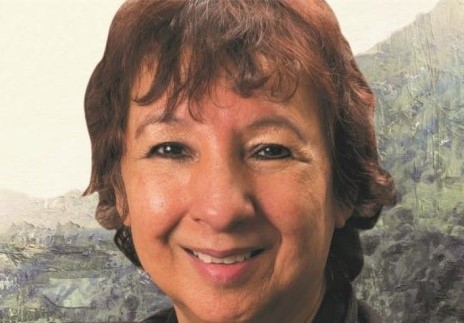
Frances Sinclair-Kaspick, a Cree woman living with disabilities in Winnipeg, and who has contributed to this month’s Accessibility News edition was recently interviewed by Stephanie Cram on CBC Manitoba's Weekend Morning Show about her advocacy work for Indigenous peoples living with disabilities and the recognition of IDAM in Manitoba.
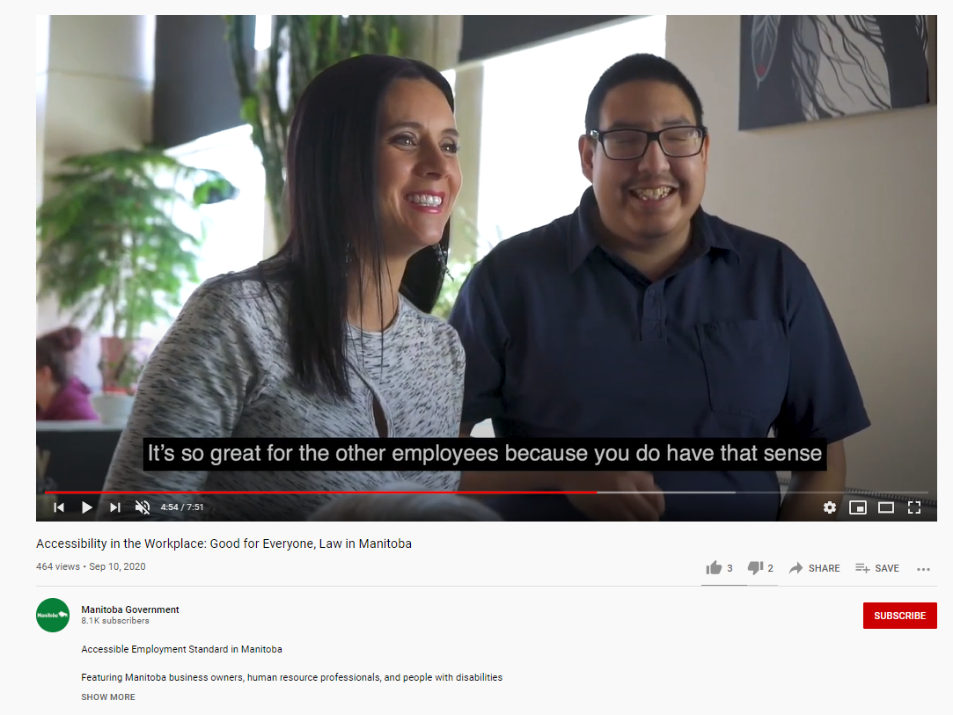
The Manitoba Accessibility Office is grateful to the team at Feast Café & Bistro for their work on accessibility and is proud to feature them in our “Accessibility in the Workplace: Good for Everyone, Law in Manitoba” video.
Manitoba Accessibility Stories

Awareness & Understanding
By Frances Sinclair-Kaspick
I am Frances Sinclair-Kaspick, a First Nation Cree woman who was born physically disABLED. I was born in Kenora, Ontario and at the age of three, my family moved to the Winnipeg’s North End, as I required ongoing medical attention for my disability. This decision to move to Winnipeg was very important for my health and wellbeing.

From the time I was born, I have encountered many barriers to daily living, including attitudinal and structural barriers. These have resulted in people thinking and acting on false assumptions towards me, and in me receiving unequal access or being excluded because of unfair policies, procedures, or practices. These barriers are frustrating, and have made me feel as if I am excluded and sitting on the sidelines of life. They have taken away my dignity as a human being, and I have been made to feel as though I am a second-class citizen.
The experience of leaving one’s home community to receive support for a disability is not unique to only me. Many Indigenous peoples with disABILITIES are forced to leave family, friends, and their homes in rural, remote, and northern communities, and to move to urban centres in order to access medical and accommodation services. Disconnected from the support of family and far from home, the move to urban centres can be isolating for Indigenous peoples, especially those with disABILITIES, where many people may even experience homelessness and feel a loss of spirit.
Prior to and during COVID-19, people with disabilities have been underrepresented in many aspects of daily life. People with disabilities are at greater risk of health complications due to COVID-19, and yet have been overlooked by the health system and in decisions that affect their health. People with disabilities across Canada have worked to have their human rights upheld during the pandemic; and have shared their experiences and concerns publicly.
Indigenous peoples are also disproportionately affeted by COVID-19. Indigenous peoples access health care systems that many people use daily, although Indigenous peoples have much different experiences. We have learned about the discrimination, racism and mistreatment experienced by Indigenous peoples at the hands of medical staff and centres. This has been well reported by the media before and during the pandemic.
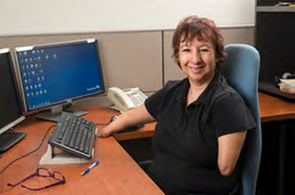 As a Cree woman with a disability, I am well aware of the barriers that have prevented people like me from receiving good care. During October 2020 and 2021, I have been a regular outpatient at Winnipeg’s Health Sciences Centre. I require regular medical attention, and during this time, I have received respect, kindness, quality consideration, and great medical care from the medical staff. As a Cree woman with a disability, I am well aware of the barriers that have prevented people like me from receiving good care. During October 2020 and 2021, I have been a regular outpatient at Winnipeg’s Health Sciences Centre. I require regular medical attention, and during this time, I have received respect, kindness, quality consideration, and great medical care from the medical staff.
For example, my personal facemasks have been modified with an elastic for my disABILITY that allows me to easily and independently put on or remove the mask. When entering the hospital, COVID procedures require me to wear a hospital-provided facemask where the elastics are placed around the ears, which is difficult for me to use own my own. However, staff have respectfully assisted me with this. I have also had positive experiences with friendly volunteers who are willing to assist me in a wheelchair from the taxi to and from my appointments.
There are also physical aspects of healthcare facilities that I have found to be positive. Buildings that feature elevators with bright lighting and brail buttons, as well as non-skid flooring, metal rumble strips, and information available in different formats about entrances, exits, and services, have helped make access to healthcare more accessible for many people. Especially in the winter months, snow removal in walking areas and ramps, as well as clean entrances free from debris and puddles are very helpful. Structural barriers can be easily removed, and benefit all people.
I am grateful for my positive experience, and thankful for the good help that I have received. As I continue to access services, I hope that I do not become a statistic to racism in the healthcare system. I firmly believe that more focus must be placed on awareness and education of unconscious bias, racism, and prejudice. Experiential learning opportunities for prospective medical students, current medical professionals, and all healthcare staff would benefit all people who access healthcare services, especially Indigenous and non-Indigenous people with disabilities. To create an inclusive society, we must all learn to acknowledge and welcome the diversity of all peoples, and to treat each other with equal dignity.
Events, Grants & Scholarships, & Resources
Events
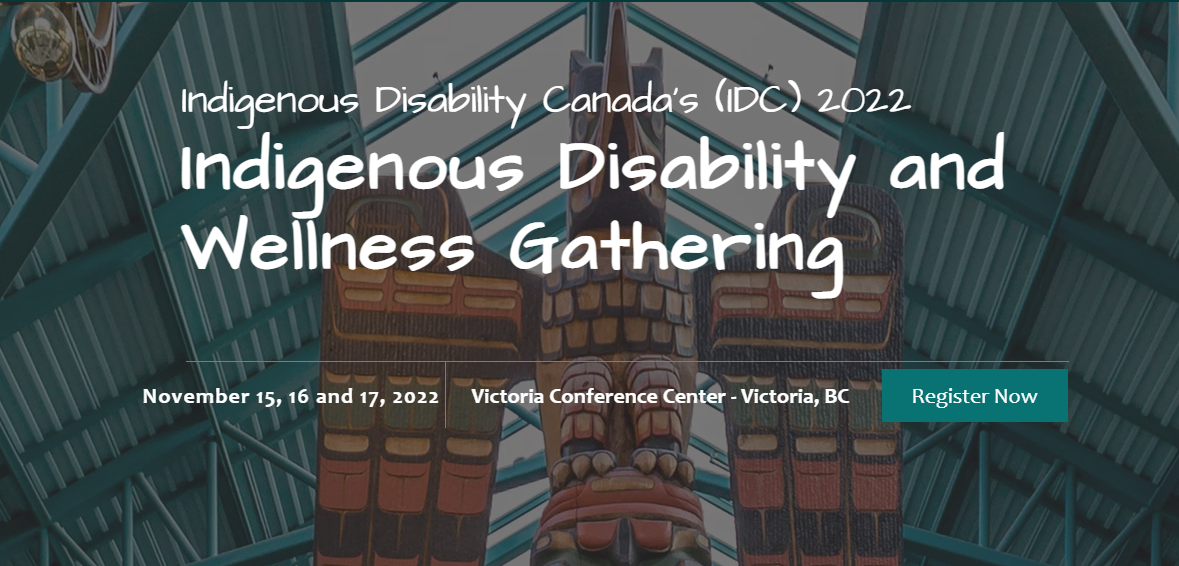
British Columbia Aboriginal Network on Disability Society (BCANDS) - Indigenous Disability & Wellness Gathering Nov 15-17, 2022
The 2022 Indigenous Disability and Wellness Gathering will be held in Victoria, BC and on the ancestral lands of the Lekwungen People. This is a celebration of BCANDS' 31st anniversary and the 8th anniversary of Indigenous Disability Awareness Month (IDAM).
The Gathering brings together Indigenous and non-Indigenous governments, leadership, service providers, community members and others to learn, connect, and collaborate in addressing the unique barriers Indigenous peoples with disabilities face.
For more information & registration, visit: https://www.indigenousdisabilitygathering.com
Resources
Financial Resources
Indigenous Support for Student Learning Program - BCANDS
The First Nations Child & Family Caring Society offers a number of scholarships & awards
Small Business Online Sales & Marketing Support for Indigenous people & people with disabilities or health conditions - Community Futures Manitoba
This newsletter is available in alternate formats on request.
You subscribed to this newsletter on the AccessibilityMB.ca website.
Manitoba Accessibility Office
630 - 240 Graham Avenue
Winnipeg, MB R3C 0J7
Phone: 204-945-7613
Toll-free: 1-800-282-8069, ext. 7613
Email: mao@gov.mb.ca
Follow and join the #AccessibleMB conversation on social media.
If you wish to unsubscribe from the newsletter, please visit: unsubscribe page
|